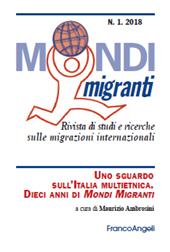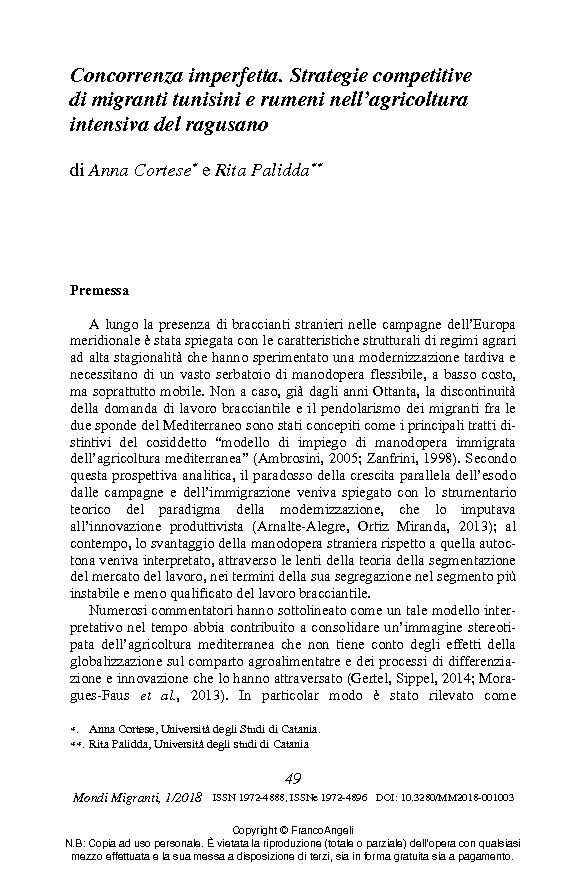Concorrenza imperfetta : strategie competitive di migranti tunisini e rumeni nell'agricoltura intensiva del ragusano
49-66 p.
L'inserimento sociale e occupazionale di migranti tunisini e rumeni in un'area ad agricoltura intensiva della Sicilia orientale presenta alcune peculiarità rispetto al tradizionale "modello mediterraneo" che si basa sul nesso strutturale fra stagionalità delle attività e mobilità dei migranti. Il regime della serricoltura allenta l'imperativo funzionale della mobilità e accresce per i migranti le opportunità di continuità e regolarità del rapporto di impiego, ma sposta le dimensioni di penalizzazione sul versante della flessibilità del salario, dell'orario e dei ritmi di produzione, con differente graduazione in relazione ai diversi profili e strategie di imprese e lavoratori. D'altra parte, la stratificazione civica dei flussi migratori non ha comportato un processo generalizzato di sostituzione dei braccianti tunisini con quelli rumeni, né ha garantito ai neocomunitari migliori condizioni di lavoro e di vita, ma ha contribuito ad istituzionalizzare un sistema mobile di convenzioni che regola il mercato
lavoro bracciantile e riproduce disuguaglianze fra diverse categorie di migranti. Le donne, che vivono un difficile rapporto fra emancipazione e benessere, subiscono una penalizzazione più grave, che si estende all'esperienza della maternità e al rapporto con i figli, ma il loro ruolo è centrale nelle strategie familiari orientate a massimizzare guadagni e qualità della vita attraverso un adattamento delle culture e dei modelli di famiglia dei paesi di origine ai vincoli e alle risorse dei contesti di arrivo. [Testo dell'editore].
The social and employment integration of Tunisian and Romanian migrants in an intensive farming area of eastern Sicily has some peculiarities compared to the traditional "Mediterranean model" which is based on the structural link between the seasonality of activities and the mobility of migrants. The greenhouse cultivation loosens the functional imperative of mobility and increases the opportunities for continuity and regularity of the employment relationship for the migrants, but shifts the size of penalization on the side of the flexibility of the wage, the working time and the rate of production to different extents depending on the profiles and strategies of firms and workers. On the other hand, the civic stratification of migratory flows neither produced a generalized process of replacement of the Tunisian workers with the Romanian ones, nor guaranteed the newcomers better working and living conditions but, instead, contributed to institutionalize a mobile system of rules that regulate
the labor market and reproduce inequalities between different groups of migrants. In particular, women, who experience a difficult balance between emancipation and well-being, suffer a more severe penalization, which extends to the experience of motherhood and the relationship with their children, but their role remains central to family strategies aimed at maximizing income and quality of life through an adaptation of the cultures and family models of the countries of origin to the constraints and resources of the host societies. [Publishers' text].
Is part of
Mondi migranti : 1, 2018-
Articles from the same issue (available individually)
-
Information
ISSN: 1972-4896
KEYWORDS
- Immigrati tunisini, immigrati rumeni, penalizzazione etnica, strati-ficazione civica, disuguaglianze di genere, maternità
- Tunisian immigrants, Romanian immigrants, ethnic penalty, civic stratification, gender inequality, maternity



